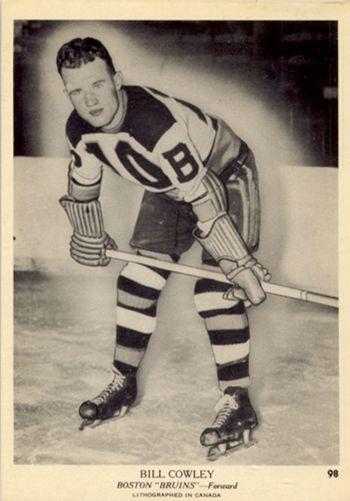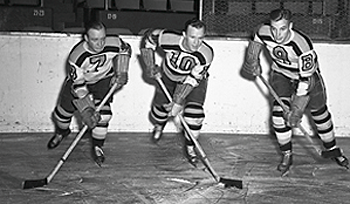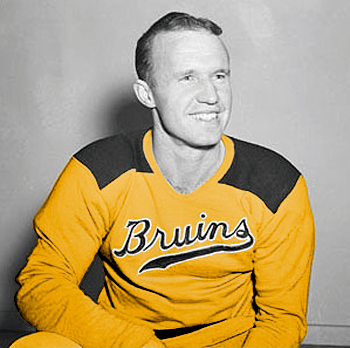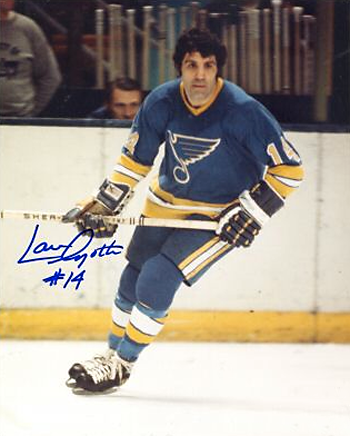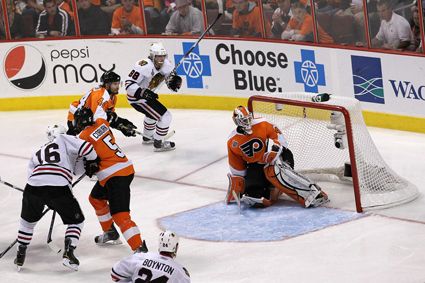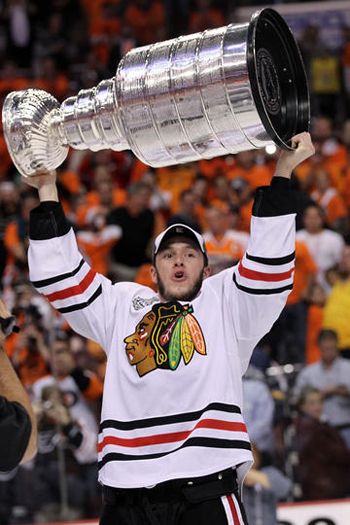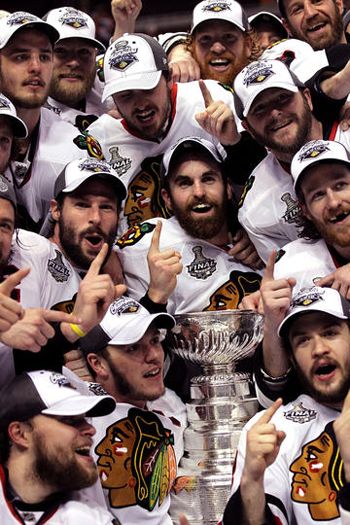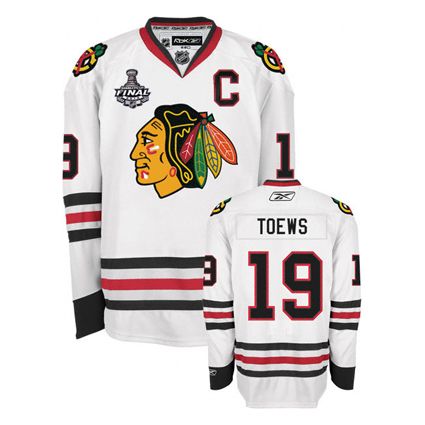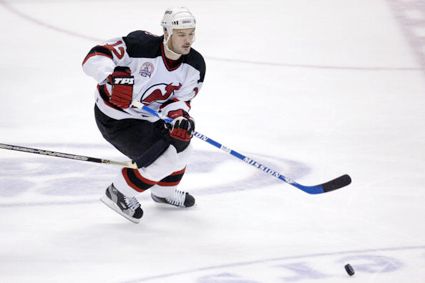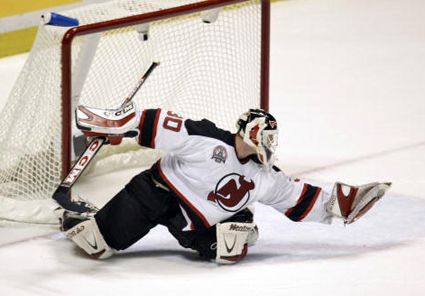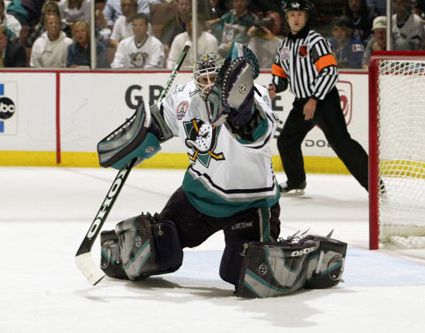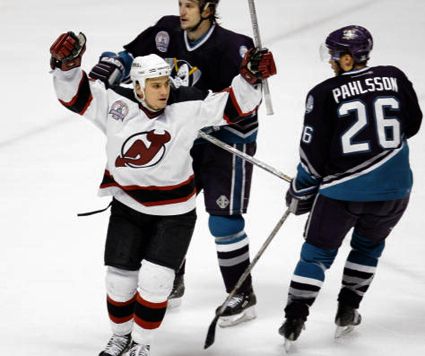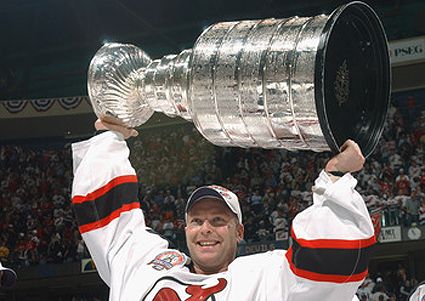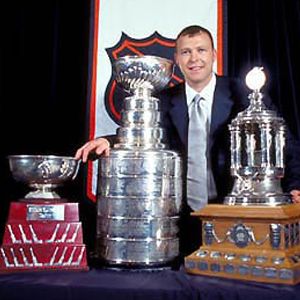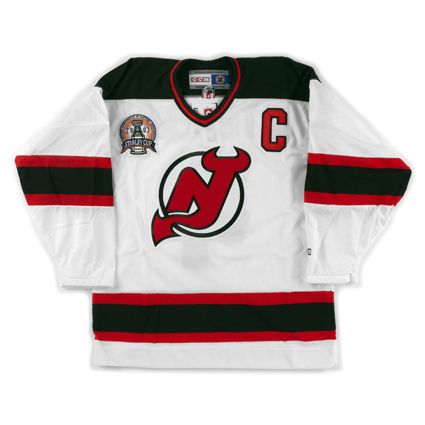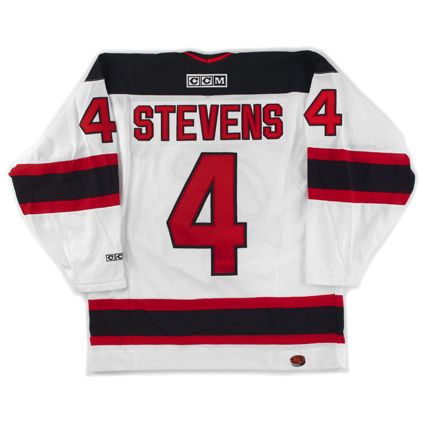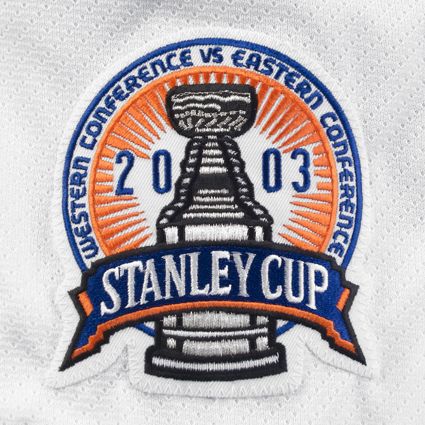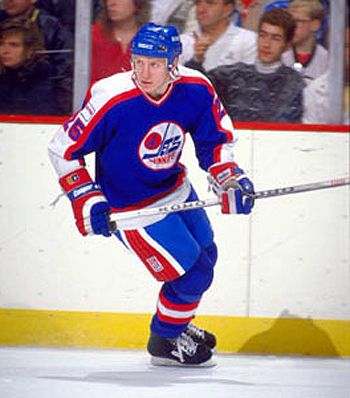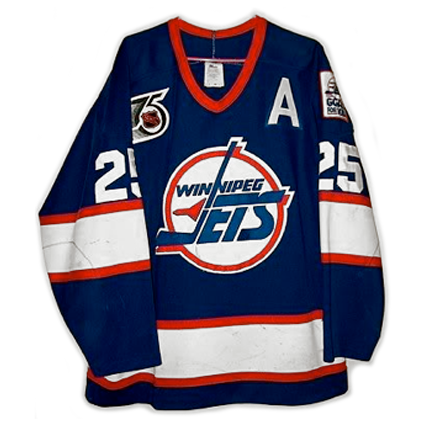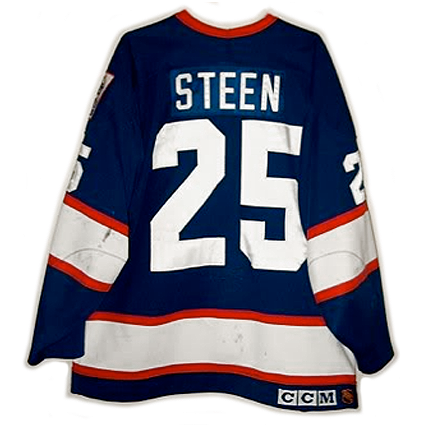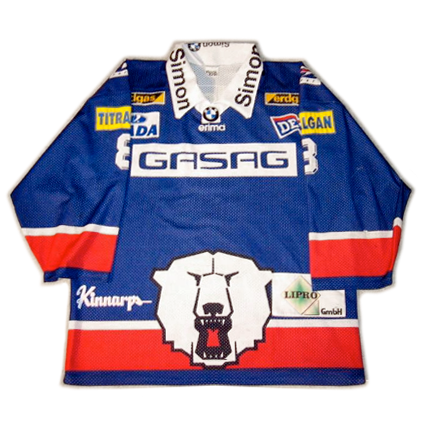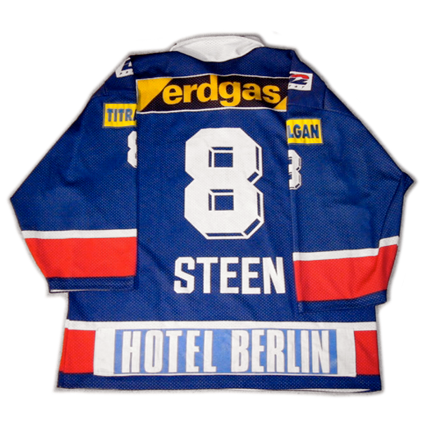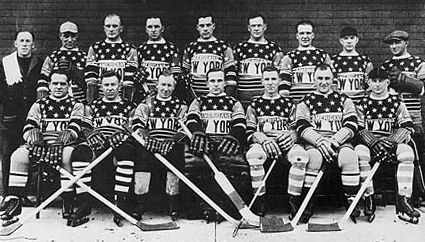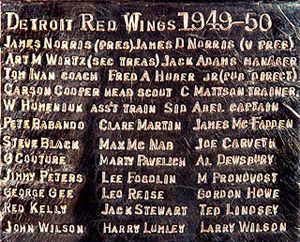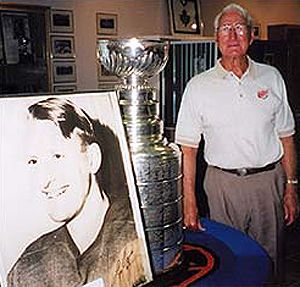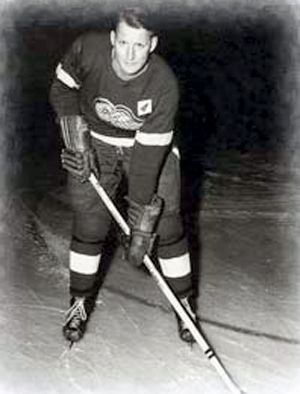Saturday, June 12, 2010
1940-41 Boston Bruins Bill Cowley Jersey
Bill Cowley, born on this date in 1912, won the scoring title in the Maritime Senior Hockey League in 1934 with 50 points in 28 games while playing for the Halifax Wolverines, giving notice as to what was to follow in the years to come.
Cowley then began his NHL career with the St. Louis Eagles during their one and only season after relocating from Ottawa. Following the demise of the Eagles, Cowley was claimed in a dispersal draft of the former St. Louis players by the Boston Bruins. Originally used as a left wing, Cowley was moved to center to take full advantage of his excellent play making abilities.
Beginning in the 1935-36 season, Cowley's point totals began a steady climb during the first four seasons of his career, first from 21 points to a team leading 35 followed by 39 points in a then 48 game season. Although limited to 34 games by injury, Cowley exceeded a point-per-game average in 1938-39 with 8 goals and 34 assists for 42 points in just 34 games to finish third overall in league scoring. He continued this pace in the playoffs with 14 points in 12 games as the Bruins won the 1939 Stanley Cup in five games over the Toronto Maple Leafs.
1939 OPC Bill Cowley hockey card
He again reached the 40 point mark the following year, but his streak of being the Bruins leading scorer ended at three. In 1940-41, Cowley then led not only the Bruins in scoring, but the entire NHL while setting a new league record of 62 points. Cowley's 45 assists alone were enough to win the scoring race, as his final point total was 40% more than his nearest challengers 44 points. While Cowley would only compete in two post-season games that season, the Bruins would win their second Stanley Cup in three seasons. At the conclusion of the season, Cowley was named the winner of the Hart Trophy.
After a short 28 game season in 1941-42, a healthy Cowley returned in 1942-43 to again lead the Bruins in scoring and set a new personal best in the process with 27 goals and 45 assists for 72 points, just one behind Chicago's Doug Bentley's new league record of 73 points. 8 more points followed in 9 playoff games as the Bruins again returned to the Stanley Cup Finals and Cowley was awarded his second Hart Trophy.
In 1943-44 Cowely had what would have been the most remarkable seasons in NHL history up to that point turn into a virtually forgotten footnote instantaneously. Cowley, who was on pace to shatter the league scoring record with 95 points, had reached 71 points and was averaging an amazing 1.97 points per game when an injury ended his season with 12 games remaining, which at the time was 25% of the schedule. Despite being limited to 36 games, Cowley's 30 goals that season would prove to be a career high.
Bill Cowley #10, centering a line for the Bruins
He returned with 65 points to lead the Bruins in scoring for the sixth time in 1944-45. He only completed in 26 games in 1945-46, but was healthy in time for the playoffs as the Bruins made another appearance in the finals. His final NHL season, his 12th with the Bruins, saw him score 38 points to finish his career as the NHL's all-time leading scorer with 548 points, scored in 549 games. He was also the last active player from the St. Louis Eagles roster.
Cowley was inducted into the Hockey Hall of Fame in 1968, the only Hall of Famer to begin his career with the St. Louis Eagles.
Today's featured jersey is a 1940-41 Boston Bruins Bill Cowley jersey from the season Cowley set a new league record with 62 points while winning the scoring title. The Bruins introduced this gold alternate jersey, as opposed to a full time road jersey, in 1940-41 and went on to win the Stanley Cup with a four game sweep of the Detroit Red Wings that year.
This gold jersey was worn for four seasons until being retired after the 1943-44 season. Prior to the introduction of today's jersey, the Bruins wore a single jersey style for both home and road games all season long, dating back to their first season of 1924-25.
Labels:
Boston Bruins,
Cowley Bill
Friday, June 11, 2010
1973-74 St. Louis Blues Lou Angotti Jersey
Lou Angotti began his hockey career with the Toronot St. Michael's Majors of the Ontario Hockey League in 1955, playing three seasons for the Majors. He then starred for the Michigan Tech Huskies of the Western Collegiate Hockey Association where he was named WCHA Rookie of the Year in 1960 and a First Team All-American in 1962 after scoring 28 goals and 51 points in a 31 game season and leading the Huskies to the 1962 WCHA and NCAA National Championship.
Following his collegiate career, Angotti played for the Kitchener-Waterloo Rangers in the OHA Senior League in 1962-63 prior to joining the Rochester Americans in the American Hockey League later that same season. Following another season in Rochester, Angotti made his NHL debut with the New York Rangers in the 1964-65 season at age 26.
The 1965-66 season had Angotti starting the season with the Rangers, but was dealt to the Chicago Black Hawks who assigned him to the St. Louis Braves of the Central Hockey League prior to his joining the parent club in Chicago in time to play 30 regular season games as well as six playoff contests.
A full season with the Black Hawks followed in 1966-67 before he was claimed by the Philadelphia Flyers in the 1967 Expansion Draft. The Flyers made Angotti their first ever team captain and he responded with the best offensive season of his NHL career, scoring 49 points in the 1967-68 season.
On this day in 1968, Angotti was traded to the St. Louis Blues, who then dealt him to the Pittsburgh Penguins later the same day! He would play for the Penguins for just one season, scoring 37 points in 1968-69.
On June 6, 1969, Angotti was once again traded to the St. Louis Blues during the 1969 Amateur Draft, only to be claimed by the Chicago Black Hawks five days later during the Intra-League Draft - exactly one year to the date that he was traded twice on the same day.
He was able to find some stability for the first time in his career, as he remained a regular member of the Chicago lineup for the next four seasons, including his second highest offensive output of 38 points in 1969-70 and two trips to the Stanley Cup Finals in 1971 and 1973.
Once more however, Angotti became property of the St. Louis Blues, for the third time, when they claimed him from Chicago during the Intra-League Draft in 1973, four years and a day after being claimed by Chicago. He finally made his debut in a Blues uniform in 1973-74, playing in 51 games before becoming the Blues head coach for the remainder of the season.
After 32 games, spread over two seasons, Angotti was fired as coach of the Blues and resumed his playing career with the Chicago Cougars of the World Hockey Association for the final 26 games of his playing career.
His final NHL totals show 653 games played, 103 goals and 186 assists for 289 points.
In 2001, Angotti was named one of the Top 50 players in WCHA history.
Today's featured jersey is a 1973-74 St. Louis Blues Lou Angotti jersey. This was the first season for this particular variation of the Blues jersey, as the year before the waist stripes were the reverse colors. They would wear this jersey until adding shoulder stripes which mirrored the home jersey in 1979, but would not undergo a major overhaul until 1984.
The 1979 version of this jersey would be revived for select games as part of the NHL's vintage uniform program in the 2003-04 season.
Here is today's featured jersey in action, as the Blues and Bruins litter the ice with gloves and sticks as they go at it. Angotti can be seen in the video wearing #14, as the players did not yet have names on the backs of their jerseys.
Labels:
Angotti Lou,
St. Louis Blues
Thursday, June 10, 2010
2009-10 Chicago Blackhawks Jonathan Toews Jersey
The Chicago Blackhawks are Stanley Cup champions.
After 49 years, the Stanley Cup will be returning to Chicago after a hard-hitting, dramatic final series that began when the Blackhawks, the #2 seeded team from the west, swept the San Jose Sharks to gain their place in the finals after a long season which began back in early October with a pair of games in Helsinki, Finland. Their opponents were the surprising and tenacious Philadelphia Flyers, who only qualified for the playoffs by winning a shootout against the New York Rangers on the final day of the season.
Seeded 7th, the Flyers eliminated the #2 New Jersey Devils, climbed out of the deepest of holes to defeat the Boston Bruins 4 games to 3 after falling behind 3 games to none, not only in the series, but 3-0 in Game 7 itself, to become only the third team in NHL history to win after being down 3-0 out of 162 tries. Taking advantage of the surprising number of first round upsets, the #7 Flyers faced off against the #8 Montreal Canadiens, who they eliminated in five games.
Game 1 of the finals was a bizarre affair, as puck after puck found the back of the net, with five goals in the first period, followed by five more in the second, leaving the teams tied at 5-5 after two periods in a flashback to the firewagon hockey of the late 1980's. Tomas Kopecky won the game for Chicago with the only goal of the third period, leaving everyone thinking they had just watched the National Pond Hockey League championships.
Game 2 was the kind of tight playoff hockey everyone expected Game 1 to be, as both teams rededicated themselves to defense first. Chicago was able to emerge with the victory after Marian Hossa and Ben Eager scored 28 second apart in the second period. Philadelphia made it a nail-biter with a power play goal at 5:20 of the third, but Antti Niemi held off the Flyers to win the game 2-1.
Philadelphia dug deep to win Game 3 at home when Claude Giroux deflected in a goal at 5:59 of overtime to win the game 4-3.
The Flyers took advantage of every opportunity to punish each Chicago mistake in Game 4 to take a 3-1 lead after the first period. Ville Leino put the Flyers up by 3 with 13 minutes to play but the Blackhawks sent a reminder that no lead was safe when they closed the margin to 1 with a pair of goals less than four minutes apart, but the Flyers sealed the victory with a Jeff Carter empty net goal with 25 seconds remaining and Chicago looking to force overtime.
Chicago continued the trend of the home team winning each game by dominating the first period, which included the physical game as well as the scoreboard, as Dustin Byfuglien sent Flyers defenseman Chris Pronger flying with the most memorable hit of the series.
Chicago's three goals on 13 shots to chase Flyers starting goaltender Michael Leighton from the game gave them a commanding lead after one period thanks to coach Joel Quenneville shaking up his line combinations, including breaking up the Jonathan Toews-Patrick Kane-Byfuglien line so Pronger would not be able to shut down all of them. For the remainder of the game, each time the Flyers would score, Chicago would respond to maintain the three goal cushion, the final one coming into an empty net 31 seconds after the Flyers pulled within two with 2 1/2 minutes remaining. Pronger would finish the game a remarkable -5 and was in the penalty box for another goal.
Game 6 back in Philadelphia saw Byfuglien score his 11th goal of the playoffs on the power play to open the scoring as Chicago dominated play, only to have the Flyers escape the period even at 1-1 with a goal with less than 20 seconds left in the first period.
The Flyers took a lead at the 8 minute mark, taking advantage of a fallen Chicago defender. Patrick Sharp's 11th goal of the playoffs two minutes later evened the score at 2-2.
Andrew Ladd tipped in a shot from an unguarded Niklas Hjalmarsson at 17:43 of the second. Chicago however, allowed the Flyers to take the game to them, especially in the second half of their third period, which finally paid off for the Flyers as they evened the score when a puck deflected past Niemi off of Marian Hossa's skate. Hossa was looking for his first Stanley Cup on his third consecutive trip to the finals with this third different club.
The remainder of the third period was played scoreless and the game moved to overtime. Some shaky play by Chicago nearly cost them the game early, but with four minutes gone, Kane got the puck out near the point from Brian Campbell, who held in a clearing attempt, put several dekes on Flyer's defenseman Kimmo Timonen and cut around him as he drove to the corner. There, from a sharp angle, he fired the puck at Leighton and watched as it beat the goalie just under his pad as he tried to get his leg down fast enough.
Once past Leighton, the puck dissappeared into the lining of the goal. Kane erupted in celebration as no one else seemed to be aware that he had just scored the cup winning goal, as the red light never came on, the referee never signaled a goal and the players on both teams failed to react. As Kane jubilantly flew down the ice waving his arms, the rest of the Blackhawks joined in on the fun as the goal was confirmed, which set off a new round of euphoria for the Blackhawks and made Niemi the first Finnish goaltender to backstop his team to the Stanley Cup.
Toews was named the winner of the Conn Smythe Trophy and then returned to the red carpet to accept the Stanley Cup on behalf of his teammates before handing it off to Hossa for the honor of being the first to receive it from the team captain.
The championship is only the fourth ever won by the Blackhawks, and only the second since 1938.
The Blackhawks turnaround has been a remarkable thing to watch. Named "The Worst Franchise in Professional Sports" by ESPN in February of 2004, the team let go their announcer of 25 years, Pat Foley, and reached a low point in 2006-07 with an average attendance of 12,727.
The turnaround began with the drafting of Toews third overall in 2006. After the 2006-07 season, fortune smiled on the Blackhawks. After finishing with the fourth-worst record in the NHL, the won the draft lottery, which allowed them to select Kane first overall in 2007.
Prior to the start of the 2007-08 season, long time club owner Bill Writz passed away and the team was taken over by his son Rocky, who immediately changed many of his father's long-standing and unpopular policies, including not allowing home games to be shown on television locally. The team also reconnected with several estranged star players of the past, including the charismatic trio of Bobby Hull, Stan Mikita and Tony Esposito as well as bringing back play by play man Foley.
They also spent money freely for new players, held their first fan convention and won the right to host the Winter Classic, the annual outdoor game on New Year's Day. They also brought in hockey genius Scotty Bowman as a senior advisor and made a quick and decisive change in coaches, putting Quenneville behind the bench after only four games of the season. By the end of the 2008-09 season, the Blackhawks, thanks in part to the 40,818 fans in attendance at the Winter Classic, averaged 22,247 fans per game, the highest average attendance of any professional hockey club in the world, just two short years after ranking 29th out of 30 in the NHL. Even without the bump from the Winter Classic, they still had the highest average attendance in the league for games played at the United Center.
They also made the playoffs in 2008-09 after missing the playoffs nine times in the previous ten seasons, making it all the way to the conference finals and gaining valuable experience for their young lineup, which they clearly put to good use in winning the championship last night.
Our featured jersey is a Reebok 2009-10 Chicago Blackhawks Jonathan Toews jersey, which features the 2010 Stanely Cup Finals patch, as worn when Toews was named the winner of the 2010 Conn Smythe trophy.
At just 22 years of age, Toews now has two World Junior Championship gold medals, a World Championship gold medal, an Olympic gold medal from the tournament in Vancouver where he was named Best Forward, and now a Conn Smythe Trophy and a Stanley Cup.
The Stanley Cup victory makes him the youngest member, at 22 years and 41 days of age, of the Triple Gold Club for players who have won a World Championship gold medal, Olympic gold medal and the Stanley Cup.
Here is video of Patrick Kane's unusual game winning goal, which was not immediately apparent to anyone but Kane himself!
In this video, Jonathan Toews lifts the Stanley Cup for the Blackhawks for the first time since 1961.
Labels:
Chicago Blackhawks,
Toews Jonathan
Wednesday, June 9, 2010
2002-03 New Jersey Devils Scott Stevens Jersey
It was on this date in 2003 that the New Jersey Devils defeated the Mighty Ducks of Anaheim 3-0 to capture their third Stanley Cup Championship in eight years.
The New Jersey Devils finished atop the Atlantic Division standings with a record of
46-20-10, good for 108 points. The highlight of their season was a one
month stretch from January 5th to February 5th in which they won 12,
tied 1 and lost 1, including a 6 game winning streak and a 9 game
unbeaten run.
The
#2 seeded Devils moved quickly through the playoffs, defeating both the
Boston Bruins and Tampa Bay Lightning in five games before coming up
against the Ottawa Senators, who took the Devils to a Game 7, which New
Jersey won by a goal on the road to reach the finals.
There,
they were paired up against the Mighty Ducks of Anaheim, the surprising
#7 seed from the Western Conference, who had knocked out both the #1
seeded Detroit Red Wings and #2 Dallas Stars on their way to the finals.
It
was the Devils third finals appearance in four years and many expected
the veteran, battle-tested Devils to have an easy time over the finals
debutant Mighty Ducks, who finished 13 points behind New Jersey in the
standings.
Game 1 saw the Devils make their intentions clear with a 3-0 blanking of the Mighty Ducks on goals by Jeff Friesen early in the second and by Grant Marshall at 5:34 of the third before Friesen sealed the game with an empty net goal in the final half minute of the game. Martin Brodeur's 5th shutout of the playoffs came on just 16 saves.
Game 2 was more of the same, as Brodeur again recorded a shutout on 16 saves yet again. Former Mighty Duck Oleg Tverdovsky set up a pair of goals for the Devils in period two by Patrik Elias and Scott Gomez.
Friesen chipped in his 8th of the playoffs 4:22 into the third to put
the game out of reach for Anaheim, who headed back to California without
having scored a single goal in New Jersey.
New Jersey tied Game 3 at 2-2 with a goal at 9:11 of the third, but could not get the game winner before Ruslan Salei won it for the Mighty Ducks at 6:59 of overtime.
Former Devil Steve Thomas spoiled Brodeur's shutout bid at 39 seconds of overtime to win Game 4 for Anaheim to even the series after four games. Jean-Sebastien Giguere's shutout came after 26 saves.
Game 5 back in New Jersey was even for the first half, with each team having scored 3 goals before a video review confirmed Jay Pandolfo's goal at 9:02 of the second was not kicked in, giving the Devils a lead they would not relinquish. Jamie Langenbrunner would score a pair of third period goals to put the game out of reach at 6-3.
Game 6 back in Anaheim is best remembered for Scott Stevens thunderous hit on Paul Kariya,
which left him laying motionless on the ice for several minutes. To
everyone's surprise, Kariya not only returned to the game, but scored a
goal at 17:15 of the second period to restore the Mighty Ducks three
goal cushion they gained in the first period on their way to a 5-2 win
to force a deciding Game 7 back in New Jersey.
Game 7, played on this date in 2003, saw the Devils get on the board first when Mike Rupp
scored the first playoff goal of his career at 2:22 of the second
period. Friesen scored yet again ten minutes later to give New
Jersey a two goal lead with just 20 minutes remaining in the season.
While the Mighty Ducks out shot the Devils 10-6 in the third period, it was Friesen scoring his 10th goal of the playoffs at 16:16 to give the Devils a comfortable 3-0 margin. The Mighty Ducks were never able to solve Brodeur, who finished the game with 24 saves and an NHL record seventh playoff shutout of the playoffs and his third of the finals to give New Jersey their third Stanley Cup Championship in eight years. The win was the Devils 12th on home ice, also a record.
While the Mighty Ducks out shot the Devils 10-6 in the third period, it was Friesen scoring his 10th goal of the playoffs at 16:16 to give the Devils a comfortable 3-0 margin. The Mighty Ducks were never able to solve Brodeur, who finished the game with 24 saves and an NHL record seventh playoff shutout of the playoffs and his third of the finals to give New Jersey their third Stanley Cup Championship in eight years. The win was the Devils 12th on home ice, also a record.
Martin Brodeur set a playoff shutout record with seven
on his way to winning the Stanley Cup in 2003
on his way to winning the Stanley Cup in 2003
Rupp's
goal was the first time in Stanley Cup history that a player's first
career goal be the Stanley Cup winning goal. The Devils win at home
concluded only the third time in NHL history, and the first since 1965,
that the home team won every game in the finals.
Langenbrunner led all playoff scorers in goals with 11 and was
tied for the points lead at 18 with Scott Niedermayer (2 goals, 16 assists). John Madden
was close behind with 16 points and Friesen's 10 goals were one back of
Langenbrunner's 11. Add in the fine defensive efforts of Stevens and
Niedermayer, along with Colin White and Brian Rafalski, helping Broduer to the shutout record, the candidates for the Conn Smythe Trophy
were numerous, so it certainly caught many off guard when Giguere was
named the winner over Broduer despite Brodeur setting the playoff shutout record
and winning their head to head battle for the cup 12 goals to 18. It
was only the fifth time a player on the losing team won the award since
it was first handed out in 1965.
Broduer was later recognized with his first Vezina Trophy for his league leading 41 wins and 9 shutouts as well as his 2.02 goals against average and .914 save percentage.
Brodeur with the Jennings Trophy, Stanley Cup and Vezina Trophy
Today's featured jersey is a 2002-03 New Jersey Devils Scott Stevens jersey.
Stevens veteran leadership, legendary hard hits and solid defense was a
primary reason that the Devils enjoyed such consistent success in his
12 seasons with the club. In 2006 his #4 was the first number retired by
the Devils.
Our video segment today begins with Stevens hit on Kariya in Game 6.
Next, highlights of Game 7 from the 2003 Stanley Cup Finals when New Jersey clinched the Stanley Cup.
Finally, a montage of highlights from the entire playoffs by the CBC.
Labels:
New Jersey Devils,
Stevens Scott
Tuesday, June 8, 2010
1991-92 Winnipeg Jets Thomas Steen Jersey
Born on this date in 1960 in Sweden, Thomas Steen began his career with Grums IK in 1975-76 and moved over to the Leksands IF junior team in 1976-77, the year he made is debut for the Sweden National Team at the European Junior Championships where he scored 8 points in 6 games as Sweden took home the gold medal.
After a move up to the Elitserien in 1977-78, Steen would play three seasons with Leksands IF. He would also participate for Sweden in the World Junior Tournament in 1978 (silver), 1979 (bronze) and 1980 (bronze). Following the 1978-79 season, Steen was drafted 103rd overall by the Winnipeg Jets.
He moved to Farjestads BK for 1980-81 and more than doubled his previous season high in points when he scored 16 goals and 23 assists for 39 points in 32 games on his way to being named 1981 Elitserien Player of the Year as Farjestads won the Swedish Championship.
Now playing at the senior level, Steen participated in both the World Championships, earning a sliver medal, and also skated in the 1981 Canada Cup.
Having reached the top of Swedish hockey, Steen moved to North America for the 1981-82 season and made his NHL debut with the Winnipeg Jets.
His first four seasons saw him adapt quite well to the North American game and his point totals improved each season, from 44 as a rookie, to 59, then 65 and then setting a career high with 30 goals on his way to 84 points in 1984-85. Prior to that season Steen also competed in his second Canada Cup, the 1984 edition in which he led the tournament in goal scoring with 7 goals in 8 games.
After three more steady seasons, which included Steen scoring 11 points in 8 games for Sweden at the 1986 World Championships, helping Sweden to bring home the silver medal, he would set a career high with 88 points from 27 goals and 61 assists in 1988-89 and follow that with his final appearance at the World Championships in 1989.
Health issues began to affect Steen, as he only played in 53 games in 1989-90, his first season under 73 games in his nine years in the NHL, due to a back injury. Those 53 games were very productive however, as Steen totaled 66 points for 1.25 points per game, the highest average of his career. He was also named as one of the team captains for 1989-90 and 1990-91.
The following season was a carbon copy of the previous one, with 67 points in just 58 games played, this time due to a broken ankle. Prior to the start of the 1991-92 season, Steen played for the Sweden National Team for the final time when he played in the 1991 Canada Cup, his third.
Another short season of 38 games in 1991-92 due to both ankle and back issues was followed by a return to health, with 80 games and 72 points in 1992-93 and 76 games and 51 points in 1993-94.
His final NHL season of 1994-95 saw him play in 31 games during the strike-shortened season and finish his 14 year NHL career, spent entirely in Winnipeg, with 950 games played, 264 goals and 553 assists for 817 points. Steen remains the second leading scorer in franchise history, including their over ten years in Phoenix as the Coyotes.
At the conclusion of his career, Winnipeg retired Steen's #25 on May 6, 1995, one of only two numbers ever retired by the Jets and the very first European player to have his number retired by an NHL club.
Steen would come out of retirement in 1996 to play with the Frankfurt Lions of the German DEL in 4 regular season and 3 playoff contests. He would continue playing the following season, joining the Berlin Polar Bears, for whom he would play for three seasons before retiring again in 1999.
Today's featured jersey is a CCM 1991-92 Winnipeg Jets Thomas Steen jersey. This jersey has the "Goals for Kids" patch on the left sleeve and features the NHL 75th Anniversary patch on the right chest as worn by all players in the NHL that season.
Bonus Jersey: Today's bonus jersey is a 1996-97 Eisbaren Berlin "Berlin Polar Bears" Thomas Steen jersey as worn during the final few seasons of Steen's career after he came out of retirement from the NHL. Steen scored 33 points in 49 games.
This jersey has the typical European flair with it's sublimated graphics, multiple, if not excessive, sponsorship logos and even sports a collar, something more common in the Scandinavian leagues. It also has the European-standard player name located below the number on the back, giving the more prominent location above the number to yet another sponsor logo.
Our video segment begins with Thomas Steen scoring with just seven seconds left in regulation to fuel a late Winnipeg comeback versus the Chicago Blackhawks from 1991-92. Note that the Blackhawks are wearing their Turn Back the Clock jerseys, worn only during the NHL's 75th Anniversary season.
Next is the retirement ceremony in Winnipeg for Thomas Steen's sweater #25.
Labels:
Berlin Polar Bears,
Steen Thomas,
Winnipeg Jets
Monday, June 7, 2010
1951-52 Detroit Red Wings Leo Reise, Jr. Jersey
Leo Reise, despite having vision in only one eye since his youth, played for the Hamilton Tigers, first in the Ontario Hockey League beginning in 1914, and then later in the NHL starting with the 1920-21 season. It was after this season that he became the father of Leo Reise, Jr. on this date in 1922. After two more seasons with the Tigers, he was then traded to the Saskatoon Crescents of the WCHL where he played for three seasons before returning to the NHL with the New York Americans for three and a half seasons prior to a half season with the New York Rangers. He then spent two seasons in the IHL with Pittsburgh before retiring. Reise, a defenseman, played eight seasons in the NHL, totaling 223 games, scoring 36 goals and 29 assists for 65 points.
1926-27 New York Americans - Leo Reise, Sr. back row, third from left
Leo Reise, Jr. followed in his father's footsteps, orginally playing junior hockey in Brantford and Guelph prior to joining the Navy and playing for teams in Victoria, Halifax and Winnipeg. With his Naval career now over, Reise, Jr. turned professional with the Chicago Black Hawks in 1945-46 for six games, and in doing so, became the first son of an NHL player to play in the NHL. He spent the majority of the season with Kansas City of the USHL and was named to the USHL First All-Star Team.
The following season he returned to the Black Hawks for 17 games prior to being traded to the Detroit Red Wings in December and getting into 31 games with Detroit where he would score his first NHL points with 4 goals and 6 assists while playing on a team with a rookie named Gordie Howe.
He became a regular in the Detroit lineup the following season and played 58 and then 59 games in 1947-48 and 1948-49, which included two consecutive trips to the Stanley Cup Finals.
Reise, Jr. had his best offensive season in 1949-50 with 21 points and Detroit once more returned to the finals, aided by Reise's overtime goals in both games 4 and 7 of the semifinals, to defeat the Rangers in double-overtime in the seventh and final game to make Leo Reise, Jr. a Stanley Cup champion.
The following year he would match his 21 point season high. In the 1951-52 season, the dominant Red Wings would cruise through the playoffs with sweeps of both Toronto and then Montreal to capture the second Stanley Cup of Reise's career.
After one more season with Detroit, his career then mirrored that of his father, as he was traded to the New York Rangers, which also turned out to be the final team of his NHL career, as he would play two seasons in Manhattan to close out his professional playing days.
In 2005, Reise was given a day with the Stanley Cup as part of a great program that allowed veteran players to participate in the now well known tradition which did not begin until 1995.
Today's featured jersey is a 1951-52 Detroit Red Wings Leo Reise, Jr. jersey. Note the unique treatment of the assistant captan's "A" which is contained in a diamond shape on the upper left chest. Captain's letters just don't get that kind of unique treatment anymore.
The classic Red Wings jersey was first introduced in 1932 when the club changed their name from the "Falcons" to the "Red Wings" and remains essentially unchanged to this day.
Check out this amazing video find, the Red Wings and Rangers prepare themselves for Game 2 of the 1950 Stanley Cup Finals, including footage of Leo Reise, Jr. talking to coach Tommy Ivan. Note the comment that the game is taking place at Toronto's Maple Leaf Gardens. This was due to Madison Square Garden in New York being occupied by a circus at the time!
Here is some more "intense sports drama", highlights of the deciding Game 7 of the 1950 finals, as the Stanley Cup is decided by a sudden-death goal in overtime. Check out the superlatives as the announcer recaps the drama of "the truly great international sport" of hockey.
Labels:
Detroit Red Wings,
Reise Leo Jr.
Subscribe to:
Comments (Atom)

